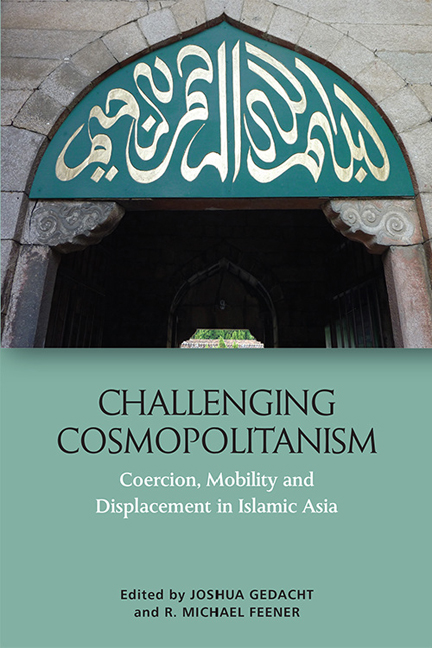Book contents
- Frontmatter
- Contents
- Preface
- 1 Hijra, Ḥajj and Muslim Mobilities: Considering Coercion and Asymmetrical Power Dynamics in Histories of Islamic Cosmopolitanism
- 2 Islamicate Cosmopolitanism from North Africa to Southeast Asia
- 3 Sufi Cosmopolitanism in the Seventeenth-century Indian Ocean: Sharīʿa, Lineage and Royal Power in Southeast Asia and the Maldives
- 4 The White Heron Called by the Muezzin: Shrines, Sufis and Warlords in Early Modern Java
- 5 Variations of ‘Islamic Military Cosmopolitanism’: The Survival Strategies of Hui Muslims during the Modern Period
- 6 Writing Cosmopolitan History in Nineteenth-century China: Li Huanyi’s Words and Deeds of Islamic Exemplars
- 7 The ‘Shaykh al-Islām of the Philippines’ and Coercive Cosmopolitanism in an Age of Global Empire
- 8 Bordering Malaya’s ‘Benighted Lands’: Frontiers of Race and Colonialism on the Malay Peninsula, 1887–1902
- 9 Afghanistan’s Cosmopolitan Trading Networks: A View From Yiwu, China
- Notes on the Contributors
- Index
9 - Afghanistan’s Cosmopolitan Trading Networks: A View From Yiwu, China
Published online by Cambridge University Press: 01 May 2021
- Frontmatter
- Contents
- Preface
- 1 Hijra, Ḥajj and Muslim Mobilities: Considering Coercion and Asymmetrical Power Dynamics in Histories of Islamic Cosmopolitanism
- 2 Islamicate Cosmopolitanism from North Africa to Southeast Asia
- 3 Sufi Cosmopolitanism in the Seventeenth-century Indian Ocean: Sharīʿa, Lineage and Royal Power in Southeast Asia and the Maldives
- 4 The White Heron Called by the Muezzin: Shrines, Sufis and Warlords in Early Modern Java
- 5 Variations of ‘Islamic Military Cosmopolitanism’: The Survival Strategies of Hui Muslims during the Modern Period
- 6 Writing Cosmopolitan History in Nineteenth-century China: Li Huanyi’s Words and Deeds of Islamic Exemplars
- 7 The ‘Shaykh al-Islām of the Philippines’ and Coercive Cosmopolitanism in an Age of Global Empire
- 8 Bordering Malaya’s ‘Benighted Lands’: Frontiers of Race and Colonialism on the Malay Peninsula, 1887–1902
- 9 Afghanistan’s Cosmopolitan Trading Networks: A View From Yiwu, China
- Notes on the Contributors
- Index
Summary
Ḥaji Nazar had been living in the city of Yiwu in China's Zhejiang Province for about two years when we first met him in March 2016. Ḥaji Nazar ran a trading office that arranged the procurement and shipment of merchandise from Yiwu's Futian market and the factories with which it is linked to the port of Rotterdam in the Netherlands. Ḥaji Nazar is a Farsi-speaking Sunni Muslim originally from a rural region of northeastern Afghanistan, but resident for many years in the northern Afghan city of Kunduz. His life has been characterised by mobility. In the mid-1970s he left Afghanistan to study in Saudi Arabia, where he also worked for a time as the cashier of a restaurateur from northern Afghanistan who ran a business in Jeddah, Saudi Arabia's principal port city. At the end of the decade, Ḥaji Nazar was awarded a scholarship to study in the United States, but he was told by officials in the Embassy of Afghanistan in Saudi Arabia that due to a change of regime in his country he would now have to return home to get a new passport to travel to the United States. Ḥaji Nazar returned to Kabul but was immediately arrested by the country's much-feared intelligence agency (KhAd). Having spent some time in jail, Ḥaji Nazar was released and thereafter played an active role in the resistance movement fighting against the pro- Soviet government of Afghanistan; more specifically, he became a member of the Islamist Hizb-i Islami party, led by Gulbuddin Hekmatyar. After some years of fighting with Hizb-i Islami mujāhidīn, Ḥaji Nazar began to have doubts about the sincerity of the leader of the regional wing of the party (for whom he also deputised) having seen the commander enter into truces with Soviet officers. Eventually, Ḥaji Nazar decided to leave the resistance and return to Saudi Arabia, a country in which he decided he would be safer than if he moved to Iran or Pakistan. Ḥaji Nazar resettled in the city of Jeddah, where he looked up his prior employer, only to discover that the restaurateur had left the city for Istanbul having had much of his savings ‘eaten’ by his local sponsor (kafil).
- Type
- Chapter
- Information
- Challenging CosmopolitanismCoercion, Mobility and Displacement in Islamic Asia, pp. 225 - 250Publisher: Edinburgh University PressPrint publication year: 2018



